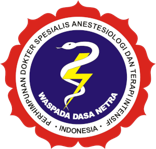Evaluating the Role of Magnesium Sulphate as an Adjunct Therapy in Non-Obstetric Refractory Status Epilepticus
Abstract
Background : Refractory Status Epilepticus (RSE) is a condition of persistent status epilepticus seizures despite appropriate anticonvulsant therapy. RSE can be fatal if not treated promptly and properly. Standard treatments for SE and RSE include benzodiazepines as first line, non-benzodiazepine agents as second line, and general anesthetic agents as third line. Magnesium Sulfate (MgSO4) is known as an anticonvulsant agent that is more often used in obstetric cases, but its use in non- obstetric RSE is limited. The purpose of this case report is to report a case of RSE that improved after administration of Mgs4
Case Illustration : A 56-year-old male patient with a history of epilepsy and left ischemic stroke, was referred with decreased consciousness after falling. The patient experienced recurrent seizures, and after treatment with diazepam and phenytoin, recurrent seizures were still found despite additional doses. After being transferred to the ICU, the patient was given therapy with midazolam, propofol, and phenobarbital, but the seizures continued to recur. After 30 hours in the ICU, MgSO4 was given intravenously two grams followed by maintenance doses. The seizures stopped and the patient remained seizure- free during the 138-hour ICU stay, with improved neurological and hemodynamic conditions.
Conclusion : MgSO4 has been shown to be effective as an anticonvulsant agent in RSE in the ICU. Its use helps stop persistent seizures and supports the patient's clinical stability. This report shows the potential of MgSO4 as a useful adjunct therapy in the management of RSE in critically ill patients.Keywords
Full Text:
PDFReferences
- Shin JW. Management strategies for refractory status epilepticus. Journal of Neurocritical Care. 2023 Dec 1;16(2):59–68.
- Kutum C, Lakhe P. Anesthetic agents in the management of status epilepticus: Current perspectives. JCA Advances [Internet]. 2025 Sep 1 [cited 2025 Oct 21];2(3):100146. Available from: https://www.sciencedirect.com/science/article/pii/S2950553425000565
- Wylie T, Sandhu DS, Murr NI. Status Epilepticus. StatPearls [Internet]. 2023 May 8 [cited 2025 Oct 21]; Available from: https://www.ncbi.nlm.nih.gov/books/NBK430686/
- Nicosia N, Giovenzana M, Misztak P, Mingardi J, Musazzi L. Glutamate-Mediated Excitotoxicity in the Pathogenesis and Treatment of Neurodevelopmental and Adult Mental Disorders. Int J Mol Sci [Internet]. 2024 Jun 1 [cited 2025 Oct 21];25(12):6521. Available from: https://pmc.ncbi.nlm.nih.gov/articles/PMC11203689/
- Kienitz R, Kay L, Beuchat I, Gelhard S, von Brauchitsch S, Mann C, et al. Benzodiazepines in the Management of Seizures and Status Epilepticus: A Review of Routes of Delivery, Pharmacokinetics, Efficacy, and Tolerability. CNS Drugs [Internet]. 2022 Sep 1 [cited 2025 Oct 21];36(9):951–75. Available from: https://link.springer.com/article/10.1007/s40263-022-00940-2
- Minicucci F, Ferlisi M, Brigo F, Mecarelli O, Meletti S, Aguglia U, et al. Management of status epilepticus in adults. Position paper of the Italian League against Epilepsy. Epilepsy & Behavior [Internet]. 2020 Jan 1 [cited 2025 Oct 21];102:106675. Available from: https://www.sciencedirect.com/science/article/pii/S1525505019308595
- Beuchat I, Rossetti AO. Anti-convulsive Drug Use in Status Therapy: Adults. NeuroPsychopharmacotherapy [Internet]. 2022 Jan 1 [cited 2025 Oct 21];3807–35. Available from: https://link.springer.com/rwe/10.1007/978-3-030-62059-2_370
- Malter MP, Neuneier J. Super-refractory status epilepticus in adults. Neurol Res Pract [Internet]. 2022 Dec 1 [cited 2025 Oct 21];4(1):1–7. Available from: https://neurolrespract.biomedcentral.com/articles/10.1186/s42466-022-00199-4
- Shaheen RS, Ismail RA, Salama EY, Korini SM, Elsaeidy AS. Efficacy and safety of 12-hour versus 24-hour magnesium sulfate in management of patients with pre-eclampsia and eclampsia: a systematic review and meta-analysis. BMC Womens Health [Internet]. 2024 Dec 1 [cited 2025 Oct 21];24(1):421. Available from: https://pmc.ncbi.nlm.nih.gov/articles/PMC11270768/
- Pergialiotis V, Sapantzoglou I, Rodolaki K, Varthaliti A, Theodora M, Antsaklis P, et al. Maternal and neonatal outcomes following magnesium sulfate in the setting of chorioamnionitis: a meta-analysis. Arch Gynecol Obstet [Internet]. 2024 Mar 1 [cited 2025 Oct 21];309(3):917–27. Available from: https://link.springer.com/article/10.1007/s00404-023-07221-3
- Chen S, Xu D, Fan L, Fang Z, Wang X, Li M. Roles of N-Methyl-D-Aspartate Receptors (NMDARs) in Epilepsy. Front Mol Neurosci [Internet]. 2022 Jan 7 [cited 2025 Oct 21];14:797253. Available from: https://pmc.ncbi.nlm.nih.gov/articles/PMC8780133/
- Sharma DD, Chandresh NR, Javed A, Girgis P, Zeeshan M, Fatima SS, et al. The Management of Preeclampsia: A Comprehensive Review of Current Practices and Future Directions. Cureus [Internet]. 2024 Jan 2 [cited 2025 Oct 21];16(1):e51512. Available from: https://pmc.ncbi.nlm.nih.gov/articles/PMC10832549/
- Tatlidil I, Ture HS, Akhan G. Factors affecting mortality of refractory status epilepticus. Acta Neurol Scand [Internet]. 2020 Feb 1 [cited 2025 Oct 21];141(2):123–31. Available from: /doi/pdf/10.1111/ane.13173
- Vamshidhar M, Pakhare V, Gooty S, Nanda A, Gopinath R, Kumar KD, et al. A Comparative Study of Magnesium Sulfate, Lignocaine, and Propofol for Attenuating Hemodynamic Response During Functional Endoscopic Sinus Surgery Under General Anaesthesia: A Prospective Randomized Trial. Turk J Anaesthesiol Reanim [Internet]. 2024 Oct 1 [cited 2025 Oct 21];52(5):188. Available from: https://pmc.ncbi.nlm.nih.gov/articles/PMC11589339/
- Guo X, Zhu Y, Ying C, Xu K, Hong Y. The impact of serum magnesium and calcium on the risk of epilepsy: A mendelian randomization study. CNS Neurosci Ther [Internet]. 2023 Oct 1 [cited 2025 Oct 21];29(10):3062. Available from: https://pmc.ncbi.nlm.nih.gov/articles/PMC10493656/
Refbacks
- There are currently no refbacks.








